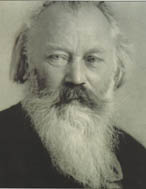

JOHANNES BRAHMS
7thMay 1833 --- 3rdApril 1897
Last Updated on March 2025
By Steven Ritchie
And now for the Music

(3711)"Hungarian Dance No.6 in D". Sequenced by Steven Ritchie.
"Hungarian Dance No.1 in G Minor". Sequence by Steven Ritchie
NEW (4634)"Symphony No.4, Mov.1". Sequenced by Tatsu.
NEW (4633)"Symphony No.4, Mov.3". Sequenced by Tatsu.
NEW (4631)"German Requiem, Opus.45, 2nd Mov". Sequenced by D.Viens.
(165)"German Requiem, Opus.45, 5th Mov". Seqenced by M.Petri
NEW (4631)"German Requiem, Opus.45, 6th Mov". Sequenced by D.Viens.
Thanks to Bumji Hisamori for the music below.
(4569)"Piano Sonata No.1". Sequenced by Bumji Hisamori. (4568)"Piano Sonata No.2". Sequenced by Bumji Hisamori. (4567)"Piano Sonata No.3". Sequenced by Bumji Hisamori. (4566)"Piano Variations, Opus.9". Sequenced by Bumji Hisamori. Thanks to Segundo.G.Yogore for the music below, Email (dody @ info com ph)
(4452)"Hungarian dance, F Sharp Minor, No.17, for 4 hands". Sequenced by Segundo.G.Yogore. (4451)"Hungarian dance, D Major, No.18, for 4 hands". Sequenced by Segundo.G.Yogore. (4450)"Hungarian dance, B Minor, No.19". Sequenced by Segundo.G.Yogore. (4449)"Hungarian dance, E Minor, No.20, for 4 hands". Sequenced by Segundo.G.Yogore. (4448)"Hungarian dance, E Minor, No.21". Sequenced by Segundo.G.Yogore. Thanks to Bernd Kruger for the music below, Email (bernd krueger @ piano-midi.de)
(4353)"Fantasy No. 2 in A minor, Opus.116". Sequenced by Bernd Kruger. (4352)"Intermezzo No.5, Opus.116". Sequencer Unknown. (4351)"Intermezzo No.6, Opus.116". Sequencer Unknown. (4350)"Fantasies, Opus.116". Real time performance by Albert Mamriev. Thanks to Jeruen E. Dery for the music below, Email (jawjaw @ hotmail.com)
(3716)"Ballade in D minor Opus.10, No.1". Sequenced by Jeruen E. Dery. (3715)"Ballade in D major Opus.10, No.2". Sequenced by Jeruen E. Dery. (3714)"Ballade in B minor Opus.10, No.3". Sequenced by Jeruen E. Dery. (3713)"Ballade in B major Opus.10, No.4". Sequenced by Jeruen E. Dery. Thanks to J. Howard Collingsworth for the music below, Email (warlock @ coastalnet.com)
(2428)"Chorale Prelude, scored for Double Reeds". Sequenced by J. Howard Collingsworth. (2429)"Chorale Prelude, scored for Organ". Sequenced by J. Howard Collingsworth. Thanks to Emily Gray for the music below, Email (HappyMusician@opendiary.com)
(2239)"Souvenir de la Russie, Opus.151, No.2, for 4-hand piano". Sequenced by Emily Gray. Thanks to Edward Gold for the music below, Email (Edward_Gold@excite.com) ..
"The slow movement of Brahms 4th Symphony". Sequence by Edward Gold
Thanks to Atyim for the Brahms Waltzs music, Email (atyim@hal.ne.jp)
(1358)"Waltz No.1". Sequenced by Atyim (1362)"Waltz No.2". Sequenced by Atyim (1366)"Waltz No.3". Sequenced by Atyim (1367)"Waltz No.4". Sequenced by Atyim (1368)"Waltz No.5". Sequenced by Atyim (1369)"Waltz No.6". Sequenced by Atyim (1363)"Waltz No.8". Sequenced by Atyim (1371)"Waltz No.9". Sequenced by Atyim (1364)"Waltz No.10". Sequenced by Atyim (1359)"Waltz No.10b". Sequenced by Atyim (1360)"Waltz No.13". Sequenced by Atyim (1372)"Waltz No.14". Sequenced by Atyim (1365)"Waltz No.15". Sequenced by Atyim (1361)"Waltz No.15b". Sequenced by Atyim (33a)"Allegro Appassionate Opus.43". Sequenced by Turry Searle (172)"Clarinet Sonata No.2, 1st Mov,(Info by Chung-Ta Lee)". Sequenced by Steve Hopkins Thanks to Welton Barker for following the music below.
(401)"Sonata in F minor for 2 pianos, Opus.34b, Mov.1". Sequenced by Welton Barker
(402)"Sonata in F minor for 2 pianos, Opus.34b, Mov.2". Sequenced by Welton Barker
(403)"Sonata in F minor for 2 pianos, Opus.34b, Mov.3". Sequenced by Welton Barker
(404)"Sonata in F minor for 2 pianos, Opus.34b, Mov.4". Sequenced by Welton Barker
(438)"Symphony No.2, Mov.1". Sequenced by Welton Barker
(439)"Symphony No.2, Mov.2". Sequenced by Welton Barker
(440)"Symphony No.2, Mov.3". Sequenced by Welton Barker
(441)"Symphony No.2, Mov.4". Sequenced by Welton Barker
Thanks to Richard Eaton for the music below.
(421)"Hungarian Dance No.5". Sequenced by Doug Fetter redone by Richard Eaton (34a)"Praelude Fugue No.2". Sequencer unknown (24a)"Praelude Fugue No.2". Sequencer unknown (151)"Ballade Op.10, No.1, (Info by Ed)". Sequencer unknown (163)"Ballade in G Minor Opus.118, No.3,(Info by Ed)". Sequencer unknown (163)"Intermezzo,Opus 118, No.6 in E flat Minor,(Info Ed and Gary K Allen)". Sequencer unknown (14)"Hungarian Dance No.3,(Info by ES)". Sequencer unknown (183)"Rhapsody in G Major,(Info by Ed)". Sequencer unknown (120)"Intermezzi Opus.117, No.1 in E flat major". Sequencer unknown

If you done any Classical pieces of say for example, Delius, mozart, and so on etc,
please email them to the classical music site with details to
"classical (@) ntlworld.com" written this way to stop spammers
just remove spaces and brackets for email address, thank you.

Visitors to this page --

Back to Classical Midi Main Menu click "HERE"